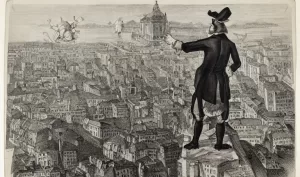Kurt Vonnegut’s Top 13 Writing Tips
Few people are brave enough or absurd enough to write an anti-war novel infused with a sci-fi story about a man traveling through time and meeting creatures from another planet.
And yet, that’s exactly what Kurt Vonnegut did in Slaughterhouse-Five.
Vonnegut wasn’t afraid to be different. He wrote exactly the way he wanted to write, which was the only way he knew how. And the result was fictional masterpieces that stimulated conversation, controversy, and celebrity.
Vonnegut passed on his writing legacy to students he taught in workshops and college classes, and his student Suzanne McConnell recently memorialized her teacher’s advice in a book called Pity the Reader.
Here are the top 13 lessons I learned from Vonnegut in Pity the Reader:
1. Don’t make the reader’s job harder.
“We must acknowledge that the reader is doing something quite difficult for him, and the reason you don’t change point of view too often is so he won’t get lost; and the reason you paragraph often is so that his eyes won’t get tired, is so you get him without him knowing it by making his job easy for him. He has to restage your show in his head — costume and light it. His job is not easy.” -Kurt Vonnegut
Vonnegut implored his students to empathize with their readers.
As you write, remember what causes you to get bored when you’re the one reading. The book you stopped reading yesterday…what caused you to put it down? What could the writer have done differently to keep you interested? How can you use that insight to improve your own writing?
Before publishing any of your work, read it through the lens of a weary reader. How can you help that reader stay interested? Do you need to add a few paragraph breaks? Do you need to simplify a few complex terms?
Use reader empathy to guide your writing.
2. Find a subject you care deeply about.
“When I teach — and I’ve taught at the Iowa Writers’ Workshop for a couple of years, at City College, Harvard — I’m not looking for people who want to be writers. I’m looking for people who are passionate, who care terribly about something.” -Kurt Vonnegut
I’m passionate about leadership, writing, and personal development. So what do I write about? Leadership, writing, and personal development.
I could probably write a decent story about other topics if I wanted to, but why bother?
Write about the things that fire you up, the things you can’t stop thinking about, and the things you complain about over dinner with friends. Write from your areas of deepest passion.
3. Embrace your role as an entertainer.
“You’re in the entertainment business.” -Kurt Vonnegut
When I began writing, I thought of myself as being in the knowledge business: my job was to deliver factual information and actionable advice.
But in reality, as writers, we’re in the entertainment business. Our competition is not only other authors, but also Instagram, HBO, Netflix, and the new blockbuster that just hit the local movie theater. We are competing for eyeballs and attention — and not in a gimmicky, clickbait way.
If you can captivate a reader’s attention with a compelling story while teaching them something valuable, they will turn to you more often for entertainment. You will gain loyal readers, followers, and fans.
4. As a writer, you are a teacher. Simplify complexity.
“Our audience requires us to be sympathetic and patient teachers, ever willing to simplify and clarify.” -Kurt Vonnegut
The world is complex, and it’s our job to simplify it. Every sci-fi author who writes about robots must find a way to communicate artificial intelligence to readers who can barely open a web browser. Every personal finance guru must find a way to communicate compounding interest to readers who can’t balance a checkbook. And every popular psychology writer must find a way to explain mirror neurons to readers who have never taken a biology class.
If you want to become a writer, you must first become a teacher. You must learn how to explain nuanced ideas while balancing simplicity and accuracy.
5. Write to effect change.
“Mainly, I think [writers] should be — and biologically have to be — agents of change.” -Kurt Vonnegut
After serving in WWII and witnessing the bombing of Dresden, Vonnegut became sickened by war.
“The destruction of Dresden was my first experience with really fantastic waste,” said Vonnegut. “To burn down a habitable city and a beautiful one at that…I was simply impressed by the wastefulness, the terrible wastefulness, the meaninglessness of war.”
How did Vonnegut decide to deal with his anti-war sentiments?
Rather than leading a march, calling his senator, or raising funds for a nonprofit, Vonnegut picked up his pen and wrote the best damn novel he could to express his anger about the war: Slaughterhouse-Five.
He wove his personal experience into the character of Billy Pilgrim and used Pilgrim’s story to showcase the travesty of war. Slaughterhouse-Five sold nearly a million copies, and its anti-war message continues to impact readers today.
6. Sound like yourself.
“I myself find that I trust my own writing most, and others seem to trust it most, too, when I sound most like a person from Indianapolis, which is what I am. What alternatives do I have? The one most vehemently recommended by teachers has no doubt been pressed on you, as well: to write like cultivated Englishmen of a century or more ago.” -Kurt Vonnegut
My favorite authors are the ones whose style and voice are so distinctive that I can identify their work without a byline. They have used their experiences to create a writing persona that cannot be copied.
The more I write, the more I learn my writing persona. It’s more refined today than it was a year ago, and it will be even more refined tomorrow.
Embrace whatever makes you distinct as a writer. You’ll develop your style, lingo, and sense of humor with each piece you publish.
7. Write when you have something to say.
“Don’t you yourself like or dislike writers mainly for what they choose to show you or make you think about? Did you ever admire an empty-headed writer for his or her mastery of the language? No.” -Kurt Vonnegut
Vonnegut’s words remind me of the first time I noticed that many of my favorite writers make grammatical and spelling mistakes in their stories online. I wondered, “How could such-and-such writer make a simple mistake like this?”
Then I realized that I wasn’t reading those authors because they were the best spellers or grammarians. I was reading them because they had a unique perspective to share about the world.
Yes, copyediting is important. I hate reading articles that contain errors. But there’s much more to a story than technical accuracy.
8. Enjoy the kinship of the writing community.
“The fact that you have completed a work of fiction of which you are proud, which you made as good as you could, makes you as close a blood relative as my brother Bernard.” -Kurt Vonnegut, writing to a first-time novelist
If you are a creator of something — anything — you know the challenges that creators face. You have felt the emptiness of creating something that no one else noticed.
But you hopefully have also felt the ecstasy of creating something that makes you proud and makes others pay attention. There’s nothing more fulfilling than pouring yourself into a story, then receiving a comment from a fellow writer saying that they enjoyed every drop of what you poured.
Blogs and writing platforms are a place to not only find inspiration but also kinship and encouragement. Embrace the community of creatives around you. Save the uplifting comments you receive from others in the writing community and use them as your fuel when you’re feeling weary or depressed. Encourage other writers, especially those who aren’t as far down the road as you.
9. Use your job for creative inspiration.
“In spite of Vonnegut’s hating [his job at GE], it provided him with the subject of his first novel and the passion to write it, as well as valuable instruction in public relations. All jobs are gold mines for fiction. Vonnegut encouraged us to write about work. People don’t write enough about it, he said.” -Suzanne McConnell
Workplaces are bustling with interesting people who behave in interesting ways. My job gives me a lot of story ideas. In fact, one of my biggest concerns with ever becoming a freelance writer is that I would lose one of my main sources of story ideas: my office environment.
Here are a few topics I’ve stumbled upon at work: why some people get promoted and others don’t, how to ask better questions, and how sharing feedback in a group setting can backfire.
Pay attention to what happens around you at work. There’s likely a story there, waiting to be discovered.
10. Write to treat your neuroses.
“People will continue to write novels, or maybe short stories, because they discover that they are treating their own neuroses.” -Kurt Vonnegut
“You will be writing about your own life anyway, but you won’t know it…Because somewhere in there is the coded psychiatric problem of the author.” -Kurt Vonnegut
Any creative habit like journaling, painting, playing music, or writing stories helps you learn more about yourself.
I’ve found that the more I write, the more I get in touch with what I’m thinking and feeling. Writing is my gateway to introspection and growth.
Writing is a deeply personal activity. Your pen is a wise counselor that will dredge up your past and force you to reconcile with it. Write to learn who you are.
11. Have the guts to cut.
“If a sentence, no matter how excellent, does not illuminate your subject in some new and useful way, scratch it out.” -Kurt Vonnegut
“Every sentence must do one of two things — reveal character or advance the action.” -Kurt Vonnegut
I’m frequently frustrated by how long it takes me to write an article. For example, I thought I would bust out this article in one or two nights, but I’ve now been working on it for a week. Part of what takes so long is the process of cutting out all of the crap.
By the time you’re done writing a story, the floor around your desk should be covered with the carcasses of unnecessary words, the heads of uninteresting characters, and the remnants of uninspiring plotlines.
Care about your readers enough to invest time in your stories. Sharpen your butcher’s knife and chop anything that doesn’t belong.
12. Pay attention to what your readers think is interesting.
“The most damning revelation you can make about yourself is that you do not know what is interesting and what is not.” -Kurt Vonnegut
I often don’t know what will connect with readers. That’s one reason why I love to see what quotes and paragraphs people highlight in my stories.
The highlight feature in Medium is like a flashlight that illuminates what resonated and what didn’t. It gives me ideas about what and how I should write in the future.
There are plenty of other ways we can learn from our readers. Here are a few:
- What headlines generate the highest views (meaning that the headline was click-worthy)
- What headlines generate a lot of views but not a lot of reads (meaning that we may have over-promised something in the headline that we didn’t deliver in the article)
- What quotes and ideas people share on social media sites like Twitter
- How many and what types of comments we receive
As writers, it’s easy for us to understand that we must teach others (see lesson #4 above). It’s harder to understand that we too must be taught. We need to learn from our readers.
13. Use humor to enlighten, enliven, and entertain.
“All of us were stuck to the surface of a ball, incidentally. The planet was ball-shaped. Nobody knew why we didn’t fall off, even though everybody pretended to kind of understand it. The really smart people understood that one of the best ways to get rich was to own a part of the surface people had to stick to.”
-Kurt Vonnegut, from the book Breakfast of Champions
Vonnegut was a master of humor. He painted realistic landscapes with satire and dark comedy. He made those landscapes come alive with his characters’ high jinks and poignant dialogue.
Vonnegut’s books are unlike anything you’ve ever read. They contain not only poems and fantastical situations but also hand-drawn cartoonish images (that Vonnegut drew himself).
Find ways to communicate old ideas in new ways. Create imagery that evokes a smile or laugh in your readers. Connect with them any way you can.
If you decide to follow them, these 13 Vonnegut tips from the book Pity the Reader will help you stand out as a writer of substance and passion.
Suzanne McConnell does an excellent job of capturing Vonnegut’s wisdom and putting you in the front row of his writing class. If you have the time, I encourage you to read the full book.
I’ll leave you with these words from Vonnegut: “The primary benefit of practicing any art, whether well or badly, is that it enables one’s soul to grow.”
May these tips expand your writing ability and enlarge your soul.





